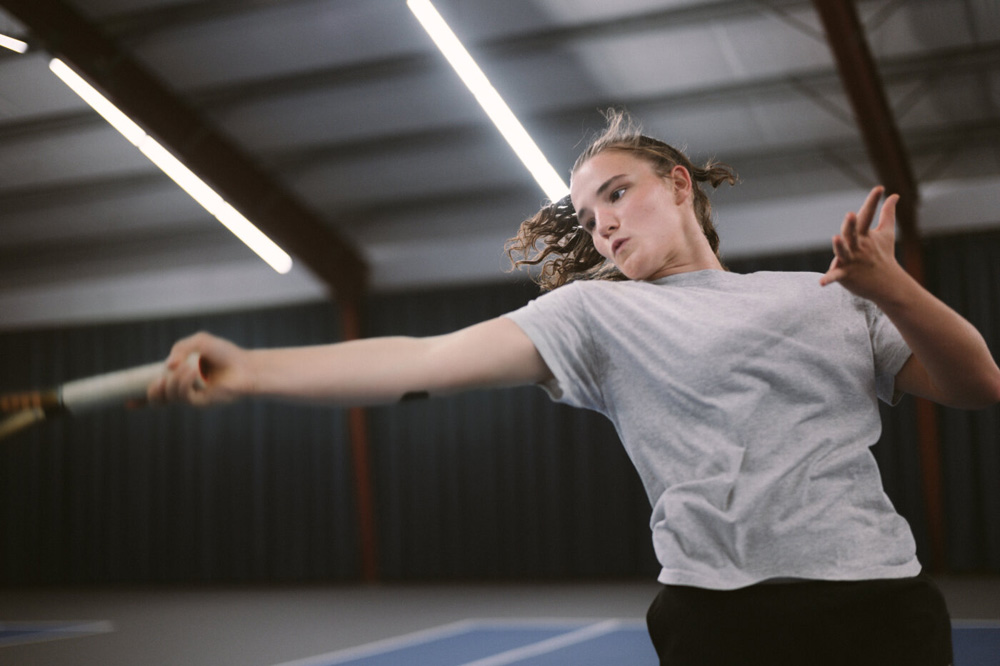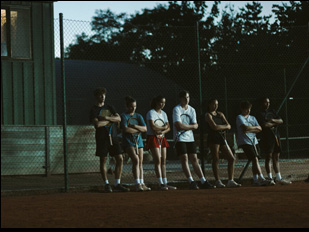“No one told you practice was cancelled?” a trainer tells Julie (Tessa Van den Broeck) early on in “Julie Keeps Quiet,” the type of athlete who is unlikely to notice that no one has joined her on the tennis court as she bats balls back and forth on her own accord. As it happens, she may have more knowledge than anyone else at her prestigious academy why the class was called off following the abrupt dismissal of her coach Jeremy, with the rest of the school piecing together that it probably had something to do with the recent suicide of one of his other star students Aline, but when the school’s investigation requires a cone of silence as individuals even tangentially involved are questioned, it’s impossible to stop gossip from flooding the zone and there’s a sense that Julie is better off from not speaking up when even the truth could make things worse.
In one of the year’s great debuts, Leonardo van Dijl considers all that’s behind that silence, following the teen as she finds herself increasingly isolated by the experience she’s had, wanting to defend her coach who has helped her so much to become a successful tennis player and at the same time has reason to be suspicious that an inappropriate relationship with Aline led to her death. Unable to confide in family that she fears might become overprotective or too judgmental or friends that might turn against her either way she goes, Julie endures a particularly tumultuous season when she is forced to make decisions for herself well beyond her years and left to process her own trauma when none of the adults in her life can be trusted.
Despite being Van Dijl’s first feature, it follows a number of shorts that have taken place in the world of sports where the mental and physical growth of a person can be observed in parallel and the determination to be the best at a given game can lead to overlooking the development of other muscles. However, “Julie Keeps Quiet” is the whole package, anchored by a stirring turn from Van den Broeck in her very first role and gripping direction from van Dijl, who allows scenes to play out at a beguiling pace where every choice his lead makes is a source of great tension both in how its arrived at and its ultimate implications. After premiering earlier this year at the Cannes Film Festival and acquired by Film Movement for a U.S. release next year, the film was selected as Belgium’s official entry to the Oscars following in the footsteps of its executive producers Luc and Jean-Pierre Dardenne and recently, van Dijl kindly spoke about how he was driven to tell this story, the power of patience in letting things unfold before the camera and finally finding an audience ready to listen.
The main inspiration was the story of Antigone, a Greek tragedy written by Sophocles about a 15-year-old girl. Her brother gets killed during a stage duel and she goes to the state, and asks if she can have the body of her brother to bury him and they say, “No, you cannot have it because he’s an enemy of the state and he doesn’t deserve to be buried.” And then she [says], “Yeah, but even enemies of the state are human beings and they have the right to be buried because they deserve peace and rest and if he’s buried, I also can rest.”
What is so interesting about that story is that in every generation, the story has new purpose. Some see it [only] as the first character who did an act of civil disobedience. Others say she was the first one to preach for human rights. And being very inspired by the Greeks, I [thought] what could a modern girl do in that way? I came up with the idea of “Julie Keeps Quiet” because in a world where she’s being pressured to speak up, she decides to keep quiet and in that way, she asks the world to “please listen to me.”
Your films to date have all taken place in the world of sports. Does a sport actually attach itself early on or come later?
When I had the idea of “Julie Keeps Quiet,” I’m a huge tennis fan, so I [thought] why not do it in the sport that I love most? But there was always this idea, this is going to be the last movie about sports in that way. At the same time, it always paid off for me. “Stephanie” was in the official competition of Cannes, and won a lot of prizes, so I already had that aspect in my pocket and could show to people I could cover the sports in a very sensible way. If I were to tell the story about a girl who keeps quiet with this, which is absolutely not an easy story to sell, it was good that I could keep it in that same universe. Five years ago when I started pitching it, it was kind of a hassle [because people said] “This is not a story. She’s keeping quiet,” but I would say, “That’s the story we need because the fact that you almost don’t recognize the story makes me even more confident because it is the sign that this story has not been told yet” and I found more and more urgency in that way to tell it.
I know how abstract this experience can be. Something similar happened during a class I was in in high school where the teacher was suspended and because the people in the know revealed so few details, it only alienated people further that were both directly involved and bystanders like myself who could only speculate. Was it difficult to find something to hold onto narratively?
That was also very important for me — that the story of Julie could take place anywhere and at any age and to boys and to girls, and I’m glad that you say it because that role of the bystander often has a very negative connotation, almost like the one who was looking away and no, it’s not true. In a way, they are victims too [because] they also did not choose for that silence that has overcome Julie. For me, this was a story about emancipation, not only of Julie but also of her surroundings and little by little, you get more of a grip on this event as you sit in with the silence of Julie and start to listen to it. Because like what you experienced, if you’re in it, it’s a shock. Everybody is in shock and as a teenager, the fact that you didn’t experience it but you were in contact with it, it’s incredibly sad.
That’s a bit why I wanted to make the movie because we should really think about how we will be educating our children because the things that older generations endured, there was no policy. There was no idea how to handle it, and now actually there is a lot of expertise, but sometimes these tools don’t find their way to the educational systems, so the other aim was to advocate for a safer world for Julie because I believe a safer world for Julie is a safer world for her generation and a safer world for that generation ultimately is a safer world for us.
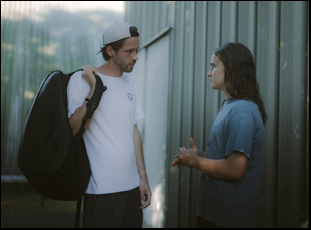
She’s just very smart and wonderful and what I liked so much about is she’s quite outspoken, quite chatty, quite bubbly even. That was something that we needed because it’s not like [Julie] keeps quiet because she’s a quiet girl. She’s just like the other teenagers, but the moment that it comes to the event, she becomes silent and I needed somebody who could give some contrast into that character. Acting is a very technical thing, and it was also important that if I was making a movie analyzing safe child practices, I learned a lot about how you should coach children and I could apply those tools to how I direct teenagers, so I didn’t want the silence to stick with [Tessa as she played Julie], so we weren’t going to go dive in into the silence of Julie. We’re gonna keep as far away as possible from it. You’re a teenager, all teenagers keep quiet about something, so you have the briefing and now we’re just going to learn the lines.
And at Cannes, Tess confirmed how amazing she is. When somebody asked like, “How was it to see yourself on the big screen for the first time?” She said, in the beginning it was a bit awkward, but after 15 minutes, I just saw a character, and that was the girl that walked in into the audition. She had that mentality, so I knew in that way, Julie was safe with Tess [playing her], but I also knew Tess would be safe in the whole context of Julie.
You build the visual composition around her being center of the frame at all times, which has to be easier said than done when it applies to the tennis scenes as well where she’s running all over the court. What was creating that relationship with her like?
First of all, Tess is an amazing tennis player, so I could basically ask her to do anything and the camera could be [very close] and she would barely not touch the camera, so that was lucky. The biggest decision we made was to shoot it on 35mm film because we wanted to have a very distinguished look that separates this story from a lot of other sports movies and what is nice about shooting on film is it obliged me to prepare, so we took a lot of time to rehearse before shooting. We had a very sharp shot list and always knew exactly what we were going to do. The briefing to the actors was also very clear. There was no “let’s try a bit of this.” It was always like, “This is the tone and we do that,” and if you shoot on film, it creates an awareness for everyone because they know the moment I say “action,” money is rolling and you can hear it from the camera. It creates a kind of excitement, almost like it makes things special.
That silence of Julie needed to be special. It needed to feel like once we start shooting that silence in that way, we make it sacramental. And at the same time, what was nice about this awareness is that it also matched the entire inner world of Julie, because she’s extremely self-aware of herself and aware that she’s being watched and everybody’s like, “Are you gonna say something? And having that camera making that sound [it makes with film], it was a reminder of how Julie was feeling in that world. She was a character in a movie that she didn’t choose to be in because she never chose the silence. It was imposed on her. So that was the biggest decision, and all the other things naturally flew out.
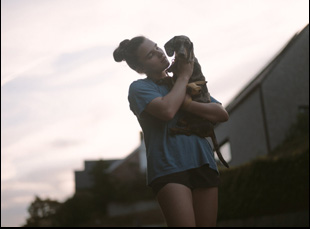
I’m a huge Caroline Shaw fan and I listened to her a lot while writing “Julie.” She’s a modern classical composer based in Brooklyn who collaborated with Rosalia, Kanye West, and with Paul McCartney and has a very wide variety of work. It was a bit of a long shot, but I [told] my manager, “I want her,” and then it was like how can we make Caroline Shaw work on this small Belgian movie? I needed to have a good idea, and the moment that I got to Zoom with her, it was like, “Okay, this is real.” Because I’m so inspired by the Greeks, I wanted to do something with the concept of the Greek choir and in every chapter [of the film], I wanted to have a team constantly evolving and expanding in that way and I wanted to do something with spoken words, which she already had in her work.
So when we spoke, I [spoke of this idea] of two teams. I want one team that is the basically the sound of silence, and then the sound of the rebirth, [which] I will only play that once because there was only one moment in the movie that [Julie] is genuinely happy. And the rest [of the film], I want to work around that silence. [Caroline] saw the movie and she came back with these two beautiful songs and they were perfect. She was like, “Wait, this is it?” I said, “Yes,” because when I was writing the story with Ruth Becquart, we said to ourselves, we’re not going to define for us the silence of Julie. I wanted that responsibility for Caroline to give sound to that and in my mind, it’s a very intimate conversation, almost like a bit spiritual where it could be between Caroline and Julie and I was not part of it, like respecting their privacy. I’m very grateful with the music because I’m so happy with the soundtrack, but also it’s one of the few things in a movie that I have [where] I just said to Caroline, “I want a choir and a song about silence and rebirth,” and the rest is really all credit to Caroline.
You’ve actually said in other interviews that you really wanted a part of the process to be mysteries that you wouldn’t know yourself. Is that difficult to manage, either as you’re developing this on set or in the edit where you’re in charge of how it’ll play?
I know what happened to Julie. I just don’t know the details. I also don’t need to know the details to understand that it’s heavy and hard and unfair, but I respect the idea of writing a character that every character comes with rules. Her rule was silence and I had to respect it because if I would break it, I would fail in the concept of the movie and I go back to “Antigone,” [where it’s] almost like a God that I had to listen to. I could almost like direct it as if I put myself into service of channeling that story. I wrote a letter before I went to [make it] where I learned so much about myself and the world we live in because of channeling Julie. I got so much more out of it because it was not about what do I want or need, but really understanding that character and questioning what does Julie want and what does she need. When I met Tessa or Caroline, or even when Naomi Osaka came on board, you know, that was because there was a higher purpose — Julie brings us all together. And in a weird way, I don’t believe that’s coincidence. I really believe the wellbeing of Julie is in a way the wellbeing of all of us that brought us together.
And the script was sometimes on the nose. There were no flashbacks in it or details given [about the situation], but Tessa is such an amazing actress that during the shooting that I was like, we don’t need this, we don’t need that. She simplified stuff and what she does things on screen I honestly have never seen before.
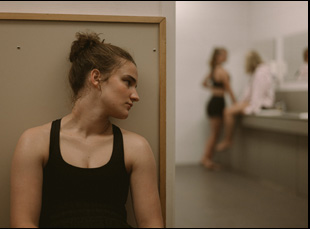
For me, too. And we had an insert [that show you who’s calling], but you know what’s going on. My DP was already like, “Bullshit. You don’t need it. You’re never going to use it.” And [I said], “Yeah, but I still need it. You never know.” And because we shot on film, I didn’t always see what we were doing because my monitor wasn’t the sharpest. It was just like a blur, but then I see her eyes and that tension and that really was a scene where I thought I have never seen that. She lures you in, and we’ve all had that situation where we looked like that at the phone and she does it with the greatest sensitivity. Then when I said “cut,” she was a completely different person. She’s one of a kind.
You mentioned Naomi Osaka, who is only a part of a really incredible group of producers that includes the Dardenne brothers and Florian Zeller. Was there anyone you were particularly nervous to show an early cut to?
During the writing process of the movie, I did not want to speak with girls like Julie. I spoke a lot with therapists, with coaches, lawyers, academics, basically people who have the expertise and know why [someone like Julie] keeps quiet because the ultimate reason why often people keep quiet is they want to have control over their narrative and they know that if they speak up in that way, they let that narrative out into the world and anything can happen with it. It can be rewritten and rewritten and for them, their narrative is the only agency and control that they have, very well knowing that there is already a chapter written that they actually want to erase. So it felt wrong in that way to talk with other victims [where] it would be almost stealing their narratives and it needed to be pure fiction because there was a line for me.
But then in the editing, I [felt] now I need the consent of somebody who knows exactly, beat by beat, what Julie is going through and I knew exactly the person I had to ask, [Naomi Osaka] was a game changer when it comes to abuse in sports, so I asked if she would consider seeing my movie. It was only the second cut and afterwards, a lot still changed, but I was the most nervous for that, because if she would have said, you cannot do this, she’d have the biggest impact. It was a very emotional moment after the movie. I think we both cried, and she said, “This is the story that the world needs now and you go and tell it.” That was exactly the confidence I needed. Every time I was insecure, I thought about the fact that we hugged each other and I knew that I had like somebody there supporting me and there with me to advocate for Julie’s silence.
“Julie Keeps Quiet” opens on March 28th in New York at the Metrograph, Chicago at the Gene Siskel Film Center and Highland Park, Illinois at the Wayfarer Theater and expands on April 4th to Los Angeles at the Laemmle Glendale, Cleveland at the Cleveland Cinematheque, Fairfax, Virginia at the Cinema Art Theatre and Vancouver, BC at the VIFF Centre. A full list of theaters and dates is here.




